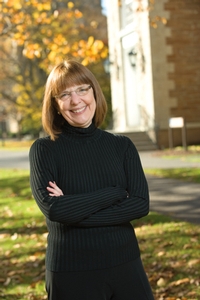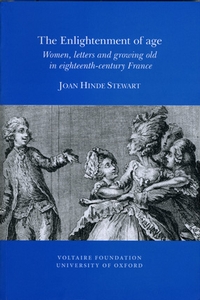Enlightenment of Age celebrates 18th century
correspondence of love and aging
President Stewart's recently published book analyzes Beauty and the Beast
A renowned scholar of 18th century French literature, President Joan Hinde Stewart’s recent book is based largely on the surviving correspondence of four literary women—intellectuals, novelists and playwrights—who wrote prolifically, frankly and movingly about their experience of growing old.
On Jan. 21, Stewart presented a talk about her book, The Enlightenment of Age, to a crowd of faculty, administrators, students and community members.
“While there is doubtless a great deal to be said about the experience of 18th century French women shop girls and servants, my training is in literary criticism, and I am predominantly interested in the written records left by women themselves. So this is a book about literate women,” said Stewart.
The four women on whose correspondences Stewart’s book is based are Isabelle de Charrière, Marie du Deffand, Françoise de Graffigny and Marie Riccoboni, who lived and wrote between 1695 and 1805.
Stewart’s talk began with her reading excerpts from a letter the French philosopher Denis Diderot wrote to his intimate friend, Sophie Volland, in which he details the differences between old men and old women. In short, Diderot suggests that old men are wise, handsome, respectable and to be admired and revered and that old women are decrepit, pitiful (or, rather, would be, if they were worthy of any attention whatsoever) and essentially a waste of life.
Interpreting Diderot’s letter, Stewart added, “‘A beautiful old woman’ is an oxymoron.”
More reviled than an old woman in 18th century France was an old woman in love. Nothing was so laughable, inappropriate or unattractive than an aging woman with any romantic—or, heaven forbid, sexual—feelings.
All four of the women whom Stewart studied had what she described as “complicated epistolary relationships” with younger—often much younger — men.
At least one, Charrière, loved and mentored a younger man who then fell madly in love with someone 25 years younger than Charrière. Graffigny went so far as to consummate her relationship with a younger man; in her astonishing letters she documents her first experience of an orgasm, at the age of 49.
 The second half of Stewart’s talk was dedicated to the authorship and complexities of plot of the Beauty and the Beast. Stewart discussed the fact that nowhere in the 1991 Disney animated film, nor in a beautiful English translation of the fairy tale published the same year, is the author acknowledged. Perhaps, Stewart suggests, this is because the author of Beauty in the Beast was a French woman, Gabrielle de Villeneuve, who wrote La Belle et la Bête in 1740. Sixteen years later, Jeanne Marie Le Prince de Beaumont published a 10-times-shorter, much simplified version—by the same name—on which the well-loved film was then based, two and a half centuries later.
The second half of Stewart’s talk was dedicated to the authorship and complexities of plot of the Beauty and the Beast. Stewart discussed the fact that nowhere in the 1991 Disney animated film, nor in a beautiful English translation of the fairy tale published the same year, is the author acknowledged. Perhaps, Stewart suggests, this is because the author of Beauty in the Beast was a French woman, Gabrielle de Villeneuve, who wrote La Belle et la Bête in 1740. Sixteen years later, Jeanne Marie Le Prince de Beaumont published a 10-times-shorter, much simplified version—by the same name—on which the well-loved film was then based, two and a half centuries later.
The reason for Stewart’s inclusion of the mysterious Beauty and the Beast author was in part because she, a forgotten 18th century woman, wrote about age—and, specifically, aging women—in a way that was complicated and often contrary to the general mood of the 18th century. In her 300-page-long La Belle et la Bête, Villeneuve wrote about the rules governing seniority among the fairies and about the fact that the oldest of them, the 1,000-year-old fairies, were the most respected and the most powerful.
This theme was especially appropriate for Villeneuve who, in her middle and later years, had what Stewart described as “untimely love”: a committed relationship with a man that earned her vilification by contemporary male writers—at the same time that she was enjoying considerable publishing success with her fairy tales and novels.
Stewart’s conclusion, both in her book and in her talk, is that 18th century French opinions and perceptions of aging and aged women were, at least in the case of the four women she studied, entirely undeserved. Contrary to popular belief at the time, women of advanced age should not simply have been ignored, disparaged and cast aside as soon as they were unfit to reproduce; rather, into old age these and other women were making valuable, even remarkable, contributions to society, worthy of acknowledgement, even acclaim.
